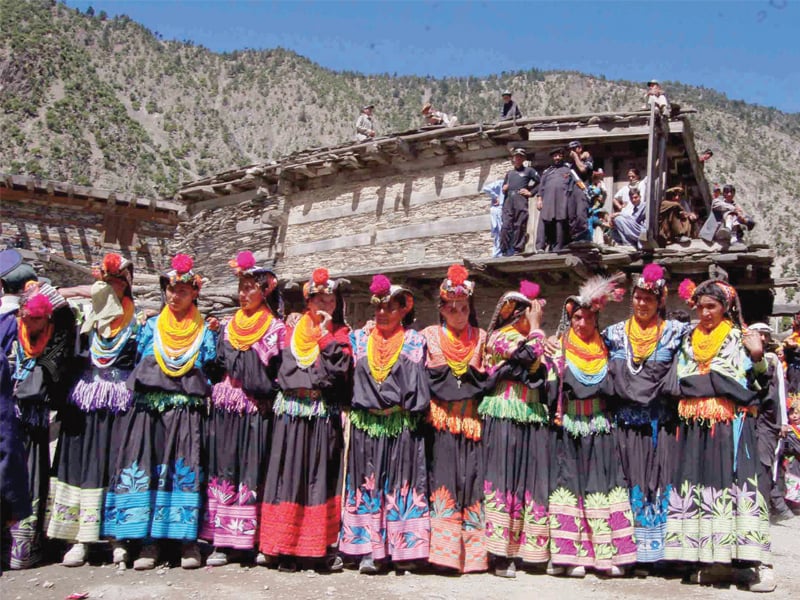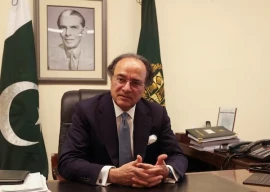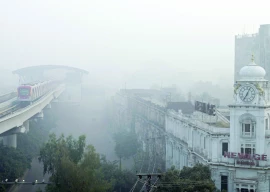
The beating of drums and burning of deodar leaves meant the Kalash festival of Chomos was started on Friday.
The festival is celebrated to mark the end of the year’s fieldwork and harvest season. Chomos is considered to have started in the winter solstice with the onset of December. The celebrations, however, will formally commence from December 9 and will reach their peak as the two-week celebration draws to a close. The festival involves a great deal of dancing, singing and burning deodar leaves, also known as Sarazari in the local language, Kalasha-mondr.
Chomos is celebrated at various places of worship in all three valleys of Kalash: Rumbur, Bumburet and Birir.
Kalash tribesman Luk Rehmat, informed The Express Tribune that farmers harvest their crops up till December 20. Rehmat said the tribesmen stick to their traditional customs and perform folk dances, despite the harsh weather.

The spirits of Kamao and Gashta, deceased tribal elders, are honoured by making sacrifices in their name at the altar of Malosh in Bumburet. PHOTO: EXPRESS
Rehmat said on the eve of festival, tribesmen slaughter sacrificial animals. He went on to add that seven days before the end of Chomos, the tribesmen lock themselves up in stables for three days and only eat the meat of the sacrificed animal. Rehmat claimed that the men were not permitted to eat the meat of a female goat, while the women could not eat the meat of male goats.
He explained that during the last three days of Chomos, no tribesman is allowed to speak to anybody from outside the community, and those who violated the law are punished by being forced to bathe in freezing cold water. “For three days, we do not allow anyone from outside to enter places of worship in all three valleys,” he said. “Not even the tribemen who live
outside Kalash.”
Kalash woman Said Gul, told The Express Tribune that on the afternoon of December 22, the last day of the festival, tribesmen from across the valleys march while beating the drums. The procession is followed by women and children and led by religious leaders known as Baitan. Singing folk songs, they move towards an open ground called a charsue. This is the customary dancing place of the Kalash, where they form a human chain and dance their way through the village.

Gul said by the evening, young tribesmen, accompanied by Baitan pay a visit to the altar of Malosh. “From here, they leave to search for a fox in the nearby mountains,” she said. “This is an age-old tradition, whereby judging by the direction in which the fox flees upon seeing the search party, Baitan make predictions about the upcoming year.”
Gul added at the end, they pray for their people and for the coming year to be prosperous. Towards the end, everyone joins in the dance.
Machah Kalash said every year a large number of Pakistani and foreign tourists make their way to Kalash for the festival, despite it being the middle of winter. This time, however, Machah said they expect fewer visitors than previous years.
“The National Highway Authority is keeping the Lowari Tunnel blocked, which will make it very difficult for tourists to reach Kalash,” said Machah, “We all hope to see more people come every year to participate in our festivals.”
Published in The Express Tribune, December 9th, 2013.
COMMENTS (2)
Comments are moderated and generally will be posted if they are on-topic and not abusive.
For more information, please see our Comments FAQ
1731325890-0/trump-(24)1731325890-0-405x300.webp)


1720507435-0/BeFunky-collage-(26)1720507435-0-165x106.webp)




1724926799-0/Untitled-design-(7)1724926799-0-270x192.webp)
1731829534-0/Copy-of-Untitled-(9)1731829534-0-270x192.webp)







It's only a matter of time before these pagans and their beautiful culture becomes history. Almost all such old festivals have been replaced by the biggest festival held every year in Raiwind, and so will his one.
Pakistan was a country of beautiful traditions, celebrations, festivals and customs. Not long ago we used to have seasonal festivals in Punjab too in which theaters, circus, qawali, kabadi and volley ball matches were fun to watch. Now most of these festivals are things of the past. Hope Kalash festival stays forever.